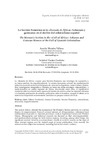Identificador persistente para citar o vincular este elemento:
https://accedacris.ulpgc.es/jspui/handle/10553/12817
| Campo DC | Valor | idioma |
|---|---|---|
| dc.contributor.author | Morales Villena, Amalia | en_US |
| dc.contributor.author | Vieitez Cerdeño, Soledad | en_US |
| dc.date.accessioned | 2015-02-14T03:30:39Z | - |
| dc.date.accessioned | 2018-03-15T14:28:55Z | - |
| dc.date.available | 2015-02-14T03:30:39Z | - |
| dc.date.available | 2018-03-15T14:28:55Z | - |
| dc.date.issued | 2014 | en_US |
| dc.identifier.issn | 1133-598X | en_US |
| dc.identifier.uri | https://accedacris.ulpgc.es/handle/10553/12817 | - |
| dc.description.abstract | La «llamada de África» supuso para Sección Femenina una estrategia de expansión y, en buena medida, de empoderamiento. La misión franquista colonial de españolización influyó en la construcción local del género de «provincias españolas» como Guinea y Sahara. Esta investigación etnográfica e histórica se centra en dicha estrategia «desarrollista» y modernizadora en ambas regiones de África, desvelando entre otros, el significativo contraste entre la extraordinaria riqueza de fuentes de archivo sobre las regiones africanas y la limitada producción de estudios publicados sobre la temática, aunque el interés en la materia ha despertado recientemente, incluidas las propias autoras del texto. | en_US |
| dc.description.abstract | The «call of Africa» allowed the expansion of the Women’s Section and even, to a certain degree, its empowerment. Franco’s colonial mission of «Hispanization» influenced local constructions of gender in «Spanish provinces» such as Equatorial Guinea and Western Sahara. Ethnographic and historical research has focused on that «developmentalist» and modernization strategy for both African regions, revealing, among other things, the significant contrast between an extraordinary wealth of archival sources on the topic of those colonial regions and the limited range of recent publications. Only recently the interest on this subject has increased, including that of the article’s authors. | en_US |
| dc.format | es | |
| dc.language | spa | en_US |
| dc.relation.ispartof | Vegueta: Anuario de la Facultad de Geografía e Historia | en_US |
| dc.source | Vegueta [ISSN 1133-598X], n. 14, p. 117-133, (2014) | en_US |
| dc.subject | 55 Historia | en_US |
| dc.subject.other | Sahara Occidental | en_US |
| dc.subject.other | Guinea Ecuatorial | en_US |
| dc.subject.other | Sección Femenina | en_US |
| dc.subject.other | Colonialismo | en_US |
| dc.subject.other | Desarrollo | en_US |
| dc.subject.other | Empoderamiento | en_US |
| dc.subject.other | Western Sahara | en_US |
| dc.subject.other | Equatorial Guinea | en_US |
| dc.subject.other | Women’s Section | en_US |
| dc.subject.other | Colonialism | en_US |
| dc.subject.other | Empowerment | en_US |
| dc.title | La Sección Femenina en la "llamada de África": Saharauis y guineanas en el declive del colonialismo español | en_US |
| dc.title.alternative | The Women’s Section in the «Call of Africa»: Saharan and Guinean Women at the Fall of Spanish Colonialism | en_US |
| dc.type | info:eu-repo/semantics/article | en_US |
| dc.type | Article | en_US |
| dc.compliance.driver | 1 | es |
| dc.identifier.absysnet | 234500 | - |
| dc.description.lastpage | 133 | en_US |
| dc.identifier.issue | 14 | - |
| dc.description.firstpage | 117 | en_US |
| dc.investigacion | Artes y Humanidades | en_US |
| dc.rights.accessrights | info:eu-repo/semantics/openAccess | es |
| dc.type2 | Artículo | en_US |
| dc.description.numberofpages | 17 | en_US |
| dc.utils.revision | Sí | en_US |
| dc.identifier.ulpgc | Sí | en_US |
| dc.description.esci | ESCI | |
| dc.description.dialnetimpact | 0,0 | |
| dc.description.dialnetq | Q4 | |
| dc.description.erihplus | ERIH PLUS | |
| item.fulltext | Con texto completo | - |
| item.grantfulltext | open | - |
| Colección: | Artículos Vegueta. n.14, 2014 | |
Visitas
34
actualizado el 10-ene-2026
Descargas
245
actualizado el 10-ene-2026
Google ScholarTM
Verifica
Comparte
Exporta metadatos
Los elementos en ULPGC accedaCRIS están protegidos por derechos de autor con todos los derechos reservados, a menos que se indique lo contrario.
